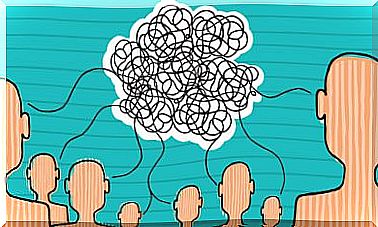The Contagion Of Emotions

The contagion of emotions is an affective mechanism by which a person automatically synchronizes their physiological and behavioral state with that of other people. That is to say, the emotional expression of who we are observing is imitated rather unconsciously. It is a type of social influence and although it differs from empathy, it could be considered its most basic manifestation.
What differentiates empathy from emotional contagion is the cognitive component. In empathy, we become aware of the thoughts and feelings of the other, understanding them and thus regulating our behavior to give an adequate response. On the other hand, in the contagion of emotions this awareness does not occur, a similar emotion is simply experienced.
According to Doherty, the main author on this topic, there is a profile of people more sensitive to emotional contagion. These are:
- People capable of reading the emotional expressions of others.
- Considered interdependent and interrelated, rather than independent and unique.
- They tend to imitate facial, vocal, and postural expressions of other people.
- Their emotions are easily influenced by comments or observations that other people make about them.
How is the contagion of emotions produced?
There appear to be several mechanisms involved in emotional contagion. On the one hand, since emotions are physiological manifestations, a neurobiological mechanism can be expected and, on the other, a social one.
Regarding the first, we humans have a “mirror system”, in charge of processing and internalizing the emotional states of those around us. This system is mainly made up of mirror neurons and, depending on whether the stimulus is motor, perceptual or emotional, it will activate the corresponding areas in the infected brain. In the case of emotional contagion, the mirror system has its core of operations in the insula. That is, when we see someone jump for joy, our mirror system will activate the motor and emotional areas of our own brain in us, generating the same sensation.
On the other hand, we are social beings and we modulate our behavior when we interact with others. Thus, when we change our way of acting through observation, speaking of social facilitation. So when we observe an emotional response in others, we tend to behave the same, because implicitly we understand that we adapt better to the situation.
What are its implications?
The contagion of emotions has consequences on all scales that we can imagine. Since you end up laughing with a friend without knowing why, until a client ends up accepting an offer from an entrepreneur.
For example, on a social level there is also emotional contagion. In critical situations such as a terrorist act or the spread of an epidemic, the contagion of emotions can lead us to situations of social hysteria.
Also within organizations it is extremely important to take into account its effects. When working in groups, it is common for the emotions of different members to spread and spread to others, and influence performance. For this reason, today it is being given more relevance and is being invested in maintaining a positive state of mind in employees. In addition, leaders and groups are taught to be more moderate in their behavior, since being people of reference they spread their emotions more easily than other members.
Is it good to get infected?
It is logical that there are doubts about whether it is beneficial to let yourself be infected by the emotions of others. Even because sometimes it is easier for us to get negative emotions, than positive ones, however, it is a process that is implicit, in addition to helping us to survive as a species.
While it is true that we have to control to some extent letting ourselves be carried away by what others feel, our behavior and value will surely improve if we let our body give us clues about how others feel. Thus, we will be one step closer to being empathetic and making this a more connected and, ultimately, better society.









